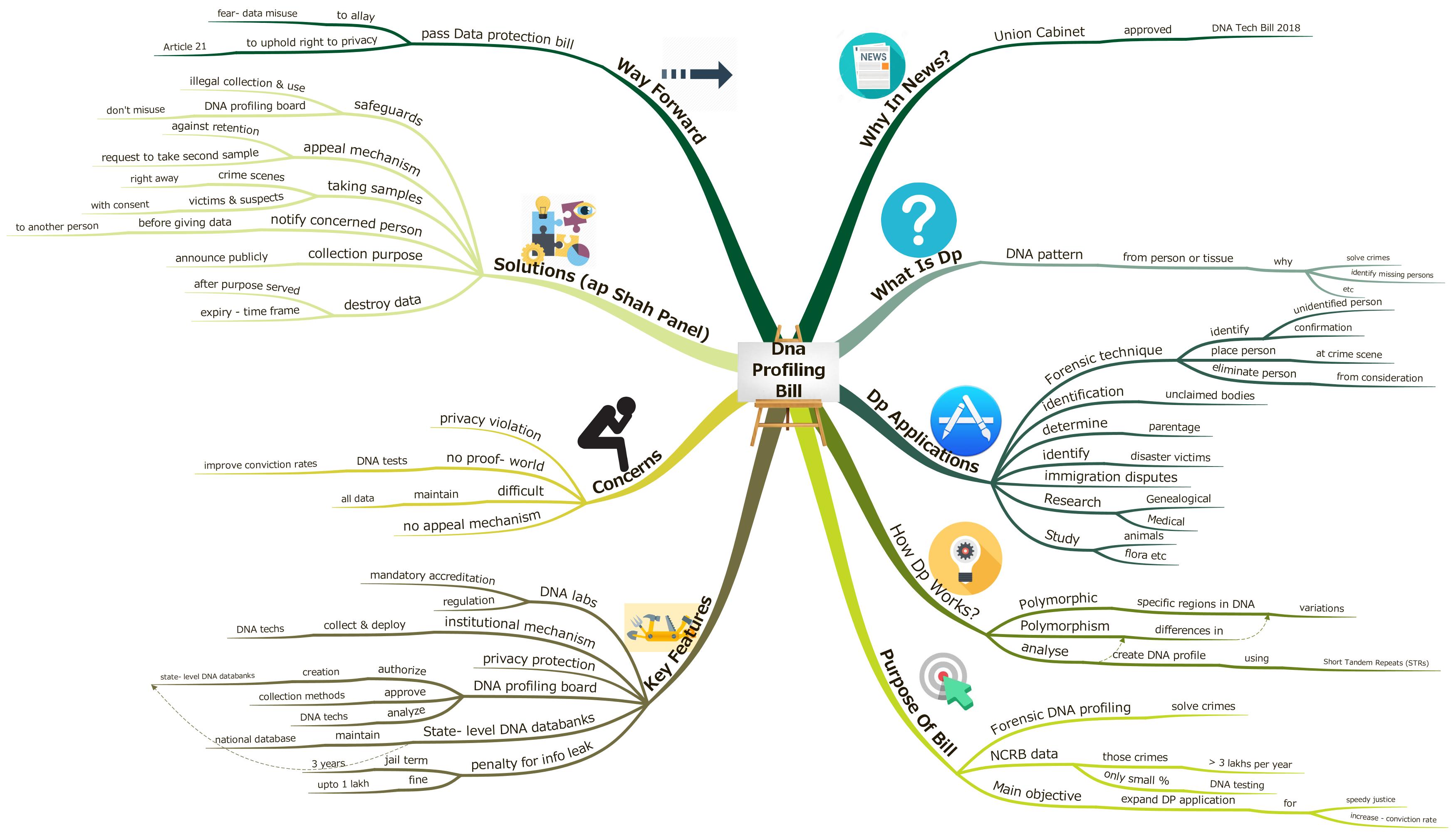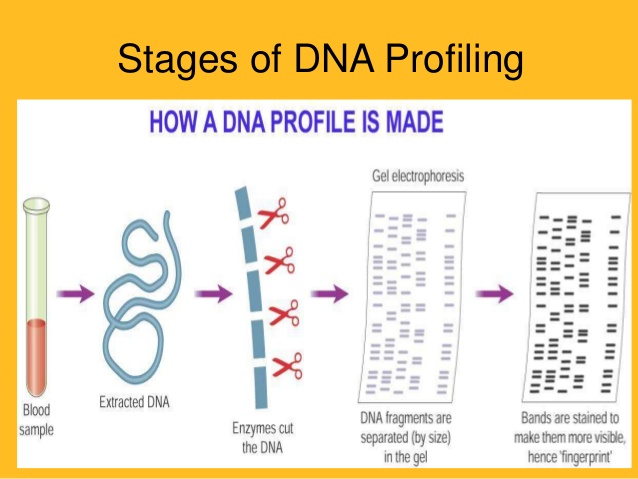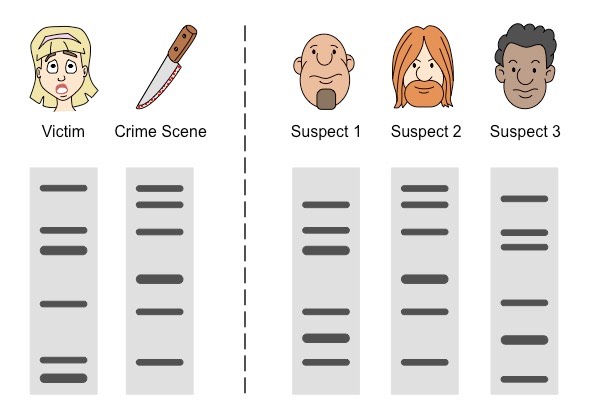“DNA Profiling” and “DNA Technology Bill 2018” – Everything you need to know

From Current Affairs Notes for UPSC » Editorials & In-depths » This topic
IAS EXPRESS Vs UPSC Prelims 2024: 85+ questions reflected
Updates are marked *
* Recently the Lok Sabha has passed the DNA Technology (Use and Regulation) Bill 2018.
What is DNA profiling?
DNA profiling is a process where a specific DNA pattern (called a profile) is obtained from a person or sample of bodily tissue for solving crimes, identifying missing persons, etc.
What are the applications of DNA profiling?
- It is most commonly used as a forensic technique in criminal investigations
- to identify an unidentified person,
- or whose identity needs to be confirmed,
- or to place a person at a crime scene,
- or to eliminate a person from consideration.
- Identification of unclaimed bodies,
- Determining parentage,
- Identify disaster victims,
- Immigration disputes,
- Genealogical research or medical research
- Study of animal and flora populations etc.
How does it work?
- Although we are all different from each other, most of our DNA is actually identical to other people’s DNA. However, specific regions in DNA vary highly between people. These regions are known as polymorphic. Differences in these variable regions between people are called as polymorphisms.
- Everyone inherits a unique combination of polymorphisms from their parents.
- Hence DNA polymorphisms can be analyzed to create a DNA profile of a person.
- Short tandem repeats (STRs) is a technique that uses polymorphisms for profiling DNA.
- They are the regions of non-coding DNA that contain repeats of the same nucleotide sequence.
- For example, GATAGATAGATAGATAGATAGATA is an STR where the nucleotide sequence GATA is repeated 6 times.
- STRs are located at different places (genetic loci) in a person’s DNA.
- To produce a proper DNA profile, scientists examine STRs at ten, or more genetic loci.
Can you identify the suspect?
What is the purpose of the DNA profiling bill?
- Forensic DNA profiling helps in offenses categorized as affecting the human body and those against property such as murder, rape, human trafficking, or grievous hurt and theft, burglary, dacoity.
- National Crime Records Bureau (NCRB) put the number of such crimes in excess of 3 lakhs per year. Of these, only a very small proportion is being subjected to DNA testing at present.
- Therefore the main purpose of the bill is to expand the application of DNA-based forensic technologies that will result in speedier delivery of justice and an increase in conviction rates which at present is only around 30%.
What are the key features of the bill?
- Mandatory accreditation and regulation of DNA laboratories.
- An institutional mechanism to collect and deploy DNA technologies for identifying persons through samples collected from crime scenes or for identifying missing persons.
- Assurance that DNA test results are reliable and the data remain protected from misuse or abuse in terms of privacy rights of the citizens.
- Creation of DNA Profiling Board – final authority to
- Authorize the creation of state-level DNA databanks.
- Approve the methods of collection and
- Analyse DNA-technologies.
- State level DNA databanks will maintain a national database for identification of victims, accused, suspects, undertrials, missing persons and unidentified humans remains.
- It imposes a jail term up to 3 years and a fine of up to Rs 1 lakh on those who leak the information stored in such facilities.
Also read: National Health Protection Scheme – All that you need to know
What are the concerns with the bill?
Violation of privacy
- Even though the bill has provisions to make it stronger and immune to data abuse, there are concerns that the collection of information on DNA is itself a violation of privacy.
- India does not have a data protection law yet (refer to this article) and that information like ancestry or susceptibility to a disease, or other genetic traits, is liable to be misused.
No evidence– It has been argued that DNA tests have not led to an improvement in conviction rates in countries where legislation is already being followed.
Limited Data Base– It is difficult to maintain all the data of the suspects along with their criminal records collected by forensic laboratories.
There is no appeal mechanism for people against data collection and for people under trial for an offense to request a second sample collection.
* Useless against identical twins: DNA is unique to identical twins = cannot find the real culprit among the twins with this technique. There are several cases around the world where both the persons (twins) were acquitted due to the lack of evidence as both their DNA is identical and an innocent cannot be punished. In such cases, fingerprints could have the advantage compared to DNA as fingerprints (even that of the twins) can never be the same among different persons.
What are the solutions? (A.P Shah committee recommendations)
- There should be safeguards to prevent the illegal collection of and use of DNA data.
- Safeguards to prevent the proposed body (DNA profiling board) from misusing them.
- There should be a mechanism for citizens to appeal against the retention of data.
- Mechanism of appeal for people under trial for requesting the second sample to be taken.
- Samples can be taken straight away from crime scenes. But the samples must be taken after consent in case of victims and suspects.
- Before giving data to a third party, the concerned person must be notified and consent must be sought.
- The purpose for which the data is being collected should be announced publicly. The data must be destroyed after the purpose is served and or time frame has expired.
- Bodies collecting, analyzing and storing DNA data should also be made to release an annual report, detailing their practices and organizational structure.
What is the way forward?
DNA technology is based on proven scientific principles and it will be very effective for social welfare especially in the delivery of Criminal Justice in India. It is high time that the Data Protection Bill drafted by Justice BN Srikrishna Committee is passed by the Parliament to allay fear over misuse of data and uphold the right to privacy provided under Article 21 of the constitution.
If you like this post, please share your feedback in the comments section below so that we will upload more posts like this.




